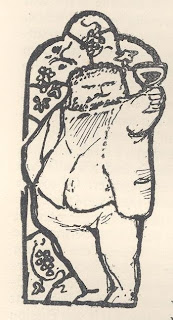
In an earlier posting (12.01.08) I suggested that some enterprising Morrisian might write for us a conversation between Oscar Wilde and William Morris on his death bed, a meeting several times referred to after Morris’s death but which in fact never took place (so all the more scope for imagination, one would think).
May Morris seems to have enjoyed the same game of inventing imaginary conversations for her father. Here, for instance, are her reflections on how a genial chat between Morris and the literary critic George Saintsbury (1845-1933) might have gone: ‘It seems a pity that the late George Saintsbury, who wrote with such brilliant discernment about my Father’s poetry, did not come into contact with him then. A third in company might have listened with refreshment to the poet and critic exchanging thoughts about grands crus and vintage-years’ (William Morris: Artist Writer Socialist, I, 64).
William Allingham wrote in his diary for 1st August 1866, ‘At dinner William Morris, pleasant, learned about wines and distilling’. We have some fine contemporary memories of Morris coming up from the cellars in Red House hands full of wine bottles and others tucked under his arms; more research could be done on Mr Diosy, Morris's wine supplier; and H.G. Wells in A Modern Utopia (1905) is shrewdly aware that ‘a News from Nowhere utopia with the wine left out’ would be a totally different, and presumably much lesser, thing (ch.2, section 6).
Saintsbury’s own side of this conversation can be gleaned from his Notes on a Cellar-Book, first published in 1920 and kept in print by wine enthusiasts intermittently since. ‘Wine has been stinted of its due literary sizings’, Saintsbury there complains, and Morris might well have agreed. But it’s clear that political differences would have troubled their oenophiliac exchanges. While Morris celebrated Ruskin calling him ‘the ablest man of his time’ with a bottle of his favourite Imperial Tokay, Saintsbury writing many years later reflects dolefully that Imperial Tokay ‘will probably never recover the disappearance of those Hapsburgs, with whom it was so inseparably connected. Republican Tokay would be a contradiction in terms’.
The raw materials, on both sides, are richly there. May Morris’s imaginary conversation simply awaits its writing up!
May Morris seems to have enjoyed the same game of inventing imaginary conversations for her father. Here, for instance, are her reflections on how a genial chat between Morris and the literary critic George Saintsbury (1845-1933) might have gone: ‘It seems a pity that the late George Saintsbury, who wrote with such brilliant discernment about my Father’s poetry, did not come into contact with him then. A third in company might have listened with refreshment to the poet and critic exchanging thoughts about grands crus and vintage-years’ (William Morris: Artist Writer Socialist, I, 64).
William Allingham wrote in his diary for 1st August 1866, ‘At dinner William Morris, pleasant, learned about wines and distilling’. We have some fine contemporary memories of Morris coming up from the cellars in Red House hands full of wine bottles and others tucked under his arms; more research could be done on Mr Diosy, Morris's wine supplier; and H.G. Wells in A Modern Utopia (1905) is shrewdly aware that ‘a News from Nowhere utopia with the wine left out’ would be a totally different, and presumably much lesser, thing (ch.2, section 6).
Saintsbury’s own side of this conversation can be gleaned from his Notes on a Cellar-Book, first published in 1920 and kept in print by wine enthusiasts intermittently since. ‘Wine has been stinted of its due literary sizings’, Saintsbury there complains, and Morris might well have agreed. But it’s clear that political differences would have troubled their oenophiliac exchanges. While Morris celebrated Ruskin calling him ‘the ablest man of his time’ with a bottle of his favourite Imperial Tokay, Saintsbury writing many years later reflects dolefully that Imperial Tokay ‘will probably never recover the disappearance of those Hapsburgs, with whom it was so inseparably connected. Republican Tokay would be a contradiction in terms’.
The raw materials, on both sides, are richly there. May Morris’s imaginary conversation simply awaits its writing up!




4 comments:
Morris did meet Wilde but not on his deathbed:
" Did the babes tell you how I met Oscar Wilde at the Richmond's? I must admit that as the dvil is painted blacker than he is, so it fares with O.W. Not but what he is an ass: but he certainly is clever too"
William Morris to Jane Morris,31st March 1881
The fascinating topic of wine as a pretext of speech is also exemplified in News from Nowhere (ch. 17) where the act of drinking determines moments of interaction among different times, epochs and days. It would be interesting to analyse the dialogic quality of wine in the works by the Pre-Raphaelites who considered drinking “a cup or two of tea or coffee, or a glass or two of beer, [to be] a heart-relished luxury. . .”
Hello. This post is likeable, and your blog is very interesting, congratulations :-). I will add in my blogroll =). If possible gives a last there on my blog, it is about the Computador, I hope you enjoy. The address is http://computador-brasil.blogspot.com. A hug.
Hi, very interesting post, greetings from Greece!
Post a Comment